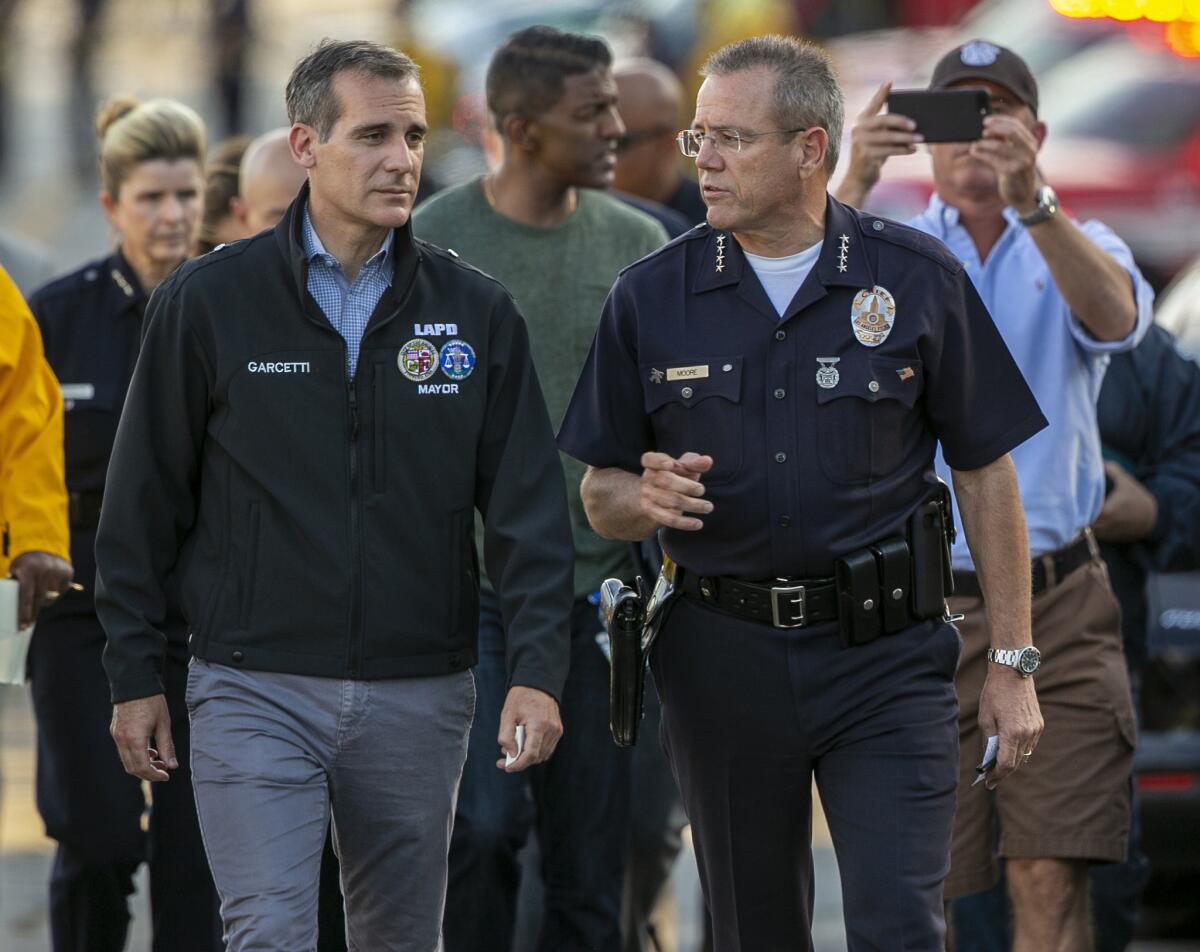L.A.’s budget is in free fall, but laying off cops should be the last resort

- Share via
Los Angeles leaders are facing a terrible decision: While the pandemic rages, economic conditions worsen and the city’s deficit grows, L.A. has no choice but to prepare to lay off employees, including police officers.
For months, Mayor Eric Garcetti and the City Council have delayed imposing furloughs and staff cuts in the desperate hope that the federal government would bail out local governments. That hasn’t happened. Nor have city employee unions agreed to postpone pay raises or make additional concessions that could help close the budget gap.
Now, the city’s deficit is expected to hit $675 million, and its leaders can’t drag their feet any longer. With the fiscal year halfway over, the cuts that Garcetti and the council make have to be even harsher to cover the shortfall by the end of June. City Administrative Officer Rich Llewellyn recommended the city begin to lengthy process needed to eliminate nearly 1,900 filled positions, including 951 police officers and 728 civilians in the Police Department. The City Council voted Tuesday to reduce the number of potential LAPD layoffs to 355 sworn and 273 civilian positions, empty the city’s reserves, borrow $150 million and scrounge around for additional cuts.
In a fiscal emergency, no department is sacrosanct. But to avoid layoffs, the Los Angeles Police Department should be willing to take other cuts and the police officers union should be willing to make concessions on pay. Why? Because laying off police officers should be the absolute last option to balance the budget, especially now. For the first time in a decade, Los Angeles recorded 300 homicides this year. The city has seen a 25% increase in killings compared with last year, and shootings are up more than 32%. There is a reason why the LAPD consumes so much of the city’s budget. City leaders have, rightly, chosen to increase the size of the police force — and civilian support staff — and invest in community policing to drive down crime and make L.A. a safer city.
There is a much-needed calibration of the LAPD underway, as Chief Michel Moore and city leaders figure out how shift responsibilities for calls for certain services — including mental health checks, noise complaints and traffic collisions — from police officers to unarmed personnel and social workers. But L.A. won’t have the money needed to create a new public safety response system anytime soon. Instead, the budget deficit could leave Angelenos with fewer police officers and fewer social services at a time when both are needed.
Los Angeles is not unique. Cities across the country are struggling to plug budget holes. Local governments generate much of their revenue from taxes on sales, business receipts and tourism. With the restrictions cities and states imposed to limit the spread of COVID-19, that economic activity has ground to a halt, and tax revenue has fallen off a cliff. Chicago considered layoffs. New York City furloughed employees. Congress and the Trump administration need to settle their differences and restore at least some of the revenue local governments sacrificed to help fight the pandemic.
But there’s also no escaping the fact that L.A. leaders’ missteps have caused the city’s financial woes to snowball.
First, Garcetti and the City Council approved pay raises and healthcare benefits in 2019 for police officers, firefighters and civilian employees, knowing that the labor contracts would cost more than the city could afford. Within months of approving the deals, city departments were directed to start cutting spending. And that was before the pandemic.
In April, anticipating the economic shock of the COVID-19 shutdowns, Garcetti’s 2020-21 budget proposal included major cuts in spending and services. He called for the city to furlough nearly 16,000 civilian employees for up to 26 days next fiscal year, the equivalent of a 10% pay cut. But the city put off that step, banking instead on a federal bailout and an unsuccessful early retirement program. At the same time, Garcetti refused to ask police officers and firefighters to suspend the scheduled pay raises or $41 million in bonuses to police officers with college degrees.
Two months later, after the death of George Floyd in Minneapolis police custody and the wave of protests against police brutality hit Los Angeles, Garcetti and the council abruptly reversed course. They voted to shift $150 million from the LAPD budget to city programs in marginalized communities, which so infuriated the rank-and-file officers union that it refuses to meet with the city to discuss pay concessions and cost savings.
The civilian furloughs are now set take effect next month. But city leaders can’t force police or firefighters to take take unpaid time off to close the budget gap, having signed labor deals in 2009 and 2011 that exempt sworn personnel from furloughs.
The city has few good options at this point, which is all the more reason the police and other city unions should be willing to pursue more ways to avoid layoffs. The end of the pandemic is in sight, and there’s a good chance L.A.’s economy can rebound quickly — if the federal aid it covets finally comes through, and if its workers are willing to make more temporary sacrifices.
More to Read
A cure for the common opinion
Get thought-provoking perspectives with our weekly newsletter.
You may occasionally receive promotional content from the Los Angeles Times.









